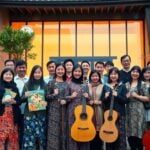In recent years, the conversation surrounding gender equality and women’s contributions to society has gained significant traction. Highlighting women’s impact is not merely a matter of social justice; it is essential for fostering a more inclusive and equitable world. When women are recognized for their achievements, it not only empowers them but also inspires future generations to pursue their ambitions.
This recognition can lead to increased funding opportunities, as many organizations and foundations are now prioritizing projects that promote gender equity and women’s empowerment. By showcasing women’s contributions in fellowship proposals, applicants can align their projects with these broader societal goals, making their proposals more appealing to potential funders. Moreover, emphasizing women’s impact can enhance the overall quality of fellowship proposals.
When applicants focus on the unique perspectives and experiences that women bring to their fields, they can create more nuanced and comprehensive narratives. This approach not only enriches the proposal but also demonstrates a commitment to diversity and inclusion. Funders are increasingly looking for projects that reflect a variety of voices and experiences, and highlighting women’s impact can help applicants stand out in a competitive landscape.
By understanding the importance of this focus, individuals seeking funding can better position themselves for success.
Identifying Key Areas of Women’s Impact in Fellowship Proposals
Women’s Contributions in STEM Fields
These areas can vary widely depending on the field of study or project focus. For instance, in the realm of science and technology, women have been at the forefront of groundbreaking research and innovation. By showcasing specific examples of female scientists who have made significant discoveries or advancements, applicants can illustrate the importance of including women’s perspectives in their projects.
Women’s Impact in Social Sciences, Arts, and Humanities
In addition to STEM fields, women’s impact is also evident in social sciences, arts, and humanities. For example, female authors, artists, and activists have historically shaped cultural narratives and social movements.
Creating a Compelling Case for Gender Equity
By identifying these key areas and weaving them into fellowship proposals, applicants can create a compelling case for why their projects are not only relevant but also necessary for advancing gender equity. This strategic identification of women’s contributions can serve as a powerful foundation for the proposal’s overall narrative.
Crafting Compelling Narratives to Showcase Women’s Contributions
Once key areas of women’s impact have been identified, the next step is to craft compelling narratives that effectively showcase these contributions. A well-structured narrative can captivate reviewers and convey the significance of women’s roles in the proposed project. To achieve this, applicants should focus on storytelling techniques that highlight individual experiences and achievements.
For instance, sharing personal anecdotes or case studies of women who have made a difference in their communities can create an emotional connection with the audience. Additionally, it is essential to frame these narratives within the broader context of societal change. By linking individual stories to larger movements or trends, applicants can demonstrate how women’s contributions are not isolated incidents but part of a larger tapestry of progress.
This approach not only enriches the proposal but also underscores the importance of supporting initiatives that amplify women’s voices. Crafting narratives in this way can make proposals more relatable and impactful, ultimately increasing their chances of success.
Utilizing Data and Evidence to Support Women’s Impact
While compelling narratives are crucial, they must be supported by data and evidence to enhance credibility. Funders often seek quantitative information that demonstrates the significance of women’s contributions in various fields. This could include statistics on women’s representation in leadership roles, research findings on gender disparities, or data illustrating the positive outcomes of women-led initiatives.
By incorporating this evidence into fellowship proposals, applicants can provide a solid foundation for their claims about women’s impact. Moreover, utilizing data effectively can help applicants identify gaps in existing research or programming related to women’s issues. This identification can lead to innovative project ideas that address these gaps while simultaneously highlighting the importance of women’s contributions.
For example, if data reveals a lack of female representation in a particular industry, an applicant could propose a fellowship project aimed at increasing mentorship opportunities for women in that field. By combining compelling narratives with robust data, applicants can create a persuasive case for funding that resonates with reviewers.
Addressing Potential Challenges and Barriers Faced by Women
In addition to highlighting women’s impact, it is essential to address the challenges and barriers they face in various fields. Acknowledging these obstacles not only demonstrates an understanding of the complexities surrounding gender equity but also positions the proposed project as a solution-oriented initiative. For instance, if an applicant is proposing a project aimed at increasing female participation in STEM fields, they should address common barriers such as lack of access to resources, mentorship opportunities, or societal biases.
By proactively discussing these challenges within fellowship proposals, applicants can showcase their commitment to creating meaningful change. This approach also allows them to outline specific strategies for overcoming these barriers through their proposed initiatives. For example, an applicant might propose workshops designed to empower young women with skills and confidence needed to pursue careers in technology.
By addressing challenges head-on and presenting actionable solutions, applicants can enhance the overall impact of their proposals.
Collaborating with Women to Amplify their Voices in Fellowship Proposals
Collaboration is a powerful tool for amplifying women’s voices in fellowship proposals. Engaging with women from diverse backgrounds and experiences can enrich the proposal’s content and ensure that it reflects a wide range of perspectives. This collaboration could take many forms, such as conducting interviews with women leaders in the field or partnering with organizations that support women’s initiatives.
By involving women directly in the proposal development process, applicants can create a more authentic representation of their contributions. Furthermore, collaboration fosters a sense of community and shared purpose among women working towards similar goals. This collective effort not only strengthens the proposal but also builds networks that can support future initiatives.
Funders often appreciate collaborative approaches as they demonstrate a commitment to inclusivity and shared leadership. By highlighting these collaborative efforts within fellowship proposals, applicants can showcase their dedication to amplifying women’s voices while also enhancing their chances of securing funding.
Leveraging Support and Resources for Women’s Initiatives
To enhance the success of fellowship proposals focused on women’s initiatives, it is essential to leverage existing support and resources available within communities and organizations dedicated to gender equity. Many foundations and nonprofits offer grants specifically aimed at supporting projects that empower women or address gender disparities. By researching these opportunities and aligning their proposals with the missions of these organizations, applicants can increase their chances of receiving funding.
Additionally, networking with other individuals or organizations involved in women’s initiatives can provide valuable insights and resources for proposal development. Attending conferences, workshops, or webinars focused on gender equity can help applicants stay informed about current trends and best practices in the field. By actively seeking out these resources and incorporating them into their proposals, applicants can demonstrate a proactive approach to addressing women’s issues while enhancing their overall project viability.
Ensuring Inclusivity and Equity in Fellowship Proposal Evaluation
Finally, it is crucial for applicants to advocate for inclusivity and equity in the evaluation process of fellowship proposals. Many funding organizations are increasingly recognizing the importance of diverse perspectives in decision-making processes. By emphasizing this commitment within their proposals, applicants can align themselves with funders who prioritize equity in their grant-making practices.
Moreover, advocating for inclusivity extends beyond just proposal submission; it involves actively engaging with funders about their evaluation criteria and processes. Applicants should seek feedback on how they can improve their proposals while also encouraging funders to consider diverse voices during evaluation discussions. By fostering an environment where inclusivity is valued, applicants not only enhance their chances of success but also contribute to a broader movement towards equitable funding practices.
In conclusion, highlighting women’s impact in fellowship proposals is essential for advancing gender equity and securing funding for meaningful initiatives. By understanding key areas of impact, crafting compelling narratives supported by data, addressing challenges faced by women, collaborating with diverse voices, leveraging resources, and advocating for inclusivity in evaluation processes, applicants can significantly enhance their chances of success. As society continues to recognize the importance of women’s contributions across various fields, those seeking funding must embrace these strategies to create impactful proposals that resonate with funders committed to promoting gender equity.


























